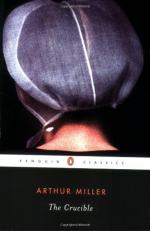|
This section contains 1,184 words (approx. 4 pages at 300 words per page) |

|
Human Relationships in "Guilty by Suspicion" and "The Crucible"
Summary: The 1991 film "Guilty by Suspicion" and the play "The Crucible" by Arthur Miller are about periods in history when people in American history were under paranoid suspicions about their actions. The effects of these eras on human relationships are examined.
Even amateurs in the psychology of human relationships still have an idea of why relationships work, what fuels them and why they end. Human relationships are vital to everyday life. Providing a defined structure that relationships can categorise under, allows us to compare and contrast human relationships in different situations, i.e. in The Crucible (play, 1953) or in Guilty by Suspicion (film, 1991) thus concluding how and why the two representations differ. Relationships between a man and woman; parent and child; individual and authority; and friend and friend are affected negatively by inherent human flaws of jealousy, greed, fear and ignorance, as well as flaws from human personality such as misunderstanding, manipulation and dishonesty.
Characters of both texts were pressured by the adversity of the anomalous circumstances of the McCarthy Period and the Salem Witchcraft trials, causing sharp turning points in the direction of the relationships. As a warning...
|
This section contains 1,184 words (approx. 4 pages at 300 words per page) |

|


